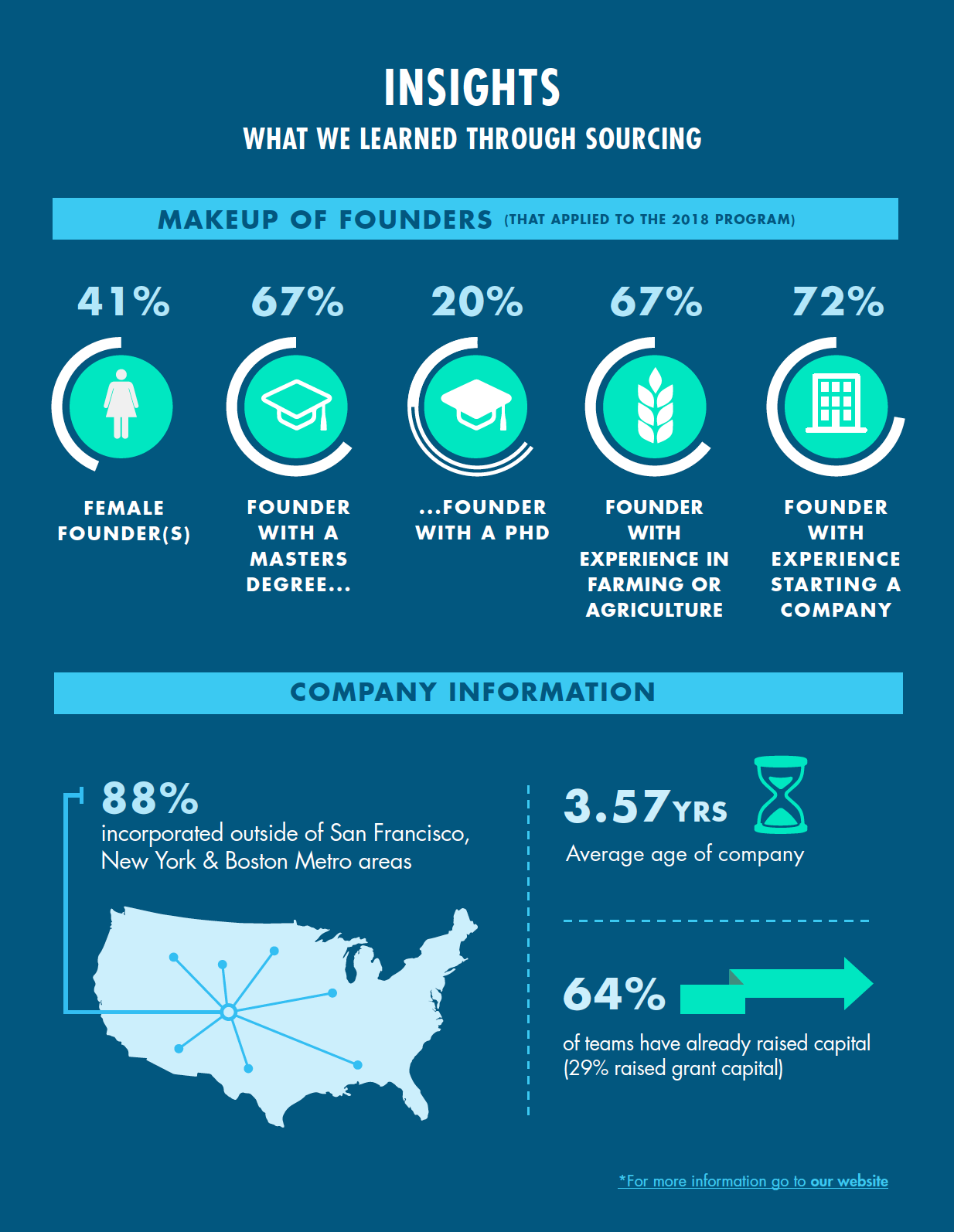April 17, 2018 in Sustainability, United States
Last week we announced the twelve startups selected for our Food and Agriculture US 2018 program.
The applicants that applied represented a cross-section of early-stage food and agriculture startups across the United States (and not just in big coastal cities—more on that below).
Read on after the jump for insights from our applicant pool, including three big takeaways about the who, what and where of early-stage food and ag innovation in the United States at this moment.
[vilcap_content_protector form="18"]

One of the biggest myths about high-tech innovation is that venture capital drives the growth of most startups. In reality, only about 1% of startups receive VC or angel investor funding. In fact, investors have been pouring money into food and ag startups across asset classes, and grant makers have an important role to play in jumpstarting innovation before investors even enter the picture.
In studying the early-stage food and ag startups that applied to our program, we learned that they had raised money from a variety of sources at the time of their application - including debt from traditional banks and friends and family. But we also found that 29% of the companies had received grant funding from government or non-profits.
This speaks to a larger truth about the sector: food and ag startups are particularly reliant on grants and other alternative forms of funding in the early stage. They tend to be solving complex, thorny problems that have a long term payoff - the first few years often consist of long product development cycles, testing (and retesting) in field trials, and detailed certification processes, often with multiple federal state and local agencies. The timeline to get a food and ag product from ideation to market can be lengthy, and grants can be critical in the early days.
[vilcap_post_cta_links]
Big data and access to computing power have opened up a new world of ideas around the way we grow and transport food, but the majority of the entrepreneurs that applied to our program have worked in the field - literally. Roughly two-thirds of the applicants have past experience in farming or agriculture, while the remaining third consisted of founders with technical skills, like academics and engineers.
Founders with lived experience can see the holes in the existing system, and those with technical expertise know how to use emerging technologies to fill them. While lived experience and/or technical expertise are not requirements for starting a successful business, we’ve always found them to be useful traits for entrepreneurs working in the complex world of food and ag.
It can be harder to start a business if you live outside of a big city. By the latest measure, about 75% venture capital investment in the United States goes to three metro areas - New York City, Boston and San Francisco.
But great ideas are everywhere, and the startups that applied to our program are more representative of the true geographic diversity of entrepreneurship - nearly nine out of ten startups that applied were from outside New York City, Boston or San Francisco.
This was not a surprise to us: some of Village Capital’s most successful food and ag portfolio companies - like Spensa Technologies and Stony Creek Colors - are from states like Indiana and Tennessee. In both examples, these companies were able to use geographic diversity to their advantage, capitalizing on proximity to their customers and local resources to build stronger businesses (for example, Stony Creek Colors has local partners across the supply chain). Investors should not shy away from companies that might be a plane ride away.
[/vilcap_content_protector]
Our newsletters share the latest about our programs, trends, ecosystem leaders, and innovative entrepreneurs in the impact world. Get the latest insights, right in your inbox by subscribing:
Village Capital needs the contact information you provide to us to contact you about our products and services. You may unsubscribe from these communications at any time. For information on how to unsubscribe, as well as our privacy practices and commitment to protecting your privacy, please review our Privacy Policy.